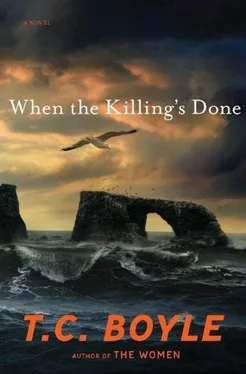Yes. That’s right. Pull the plug and let it all wash down the drain, the blisters, the backbreak, the stock and the improvements, the gas-fired water pump and the saddle horses and all the rest, the taste of the dirt between your teeth when the sundowners are clipping over the hills and the deepest requited love of a place that was like the love of the soul of God, let it go. Because Mr. Gherini’s agent, stepping delicately through the mud in his city shoes, said, “I’m very sorry to have to tell you this, Mr. Russell, but I have instructions to inform you that you’ve got two weeks to vacate.”
Bax had thrown it back at him: “What are you talking about?”
The agent — erect, in command, though he couldn’t have stood more than five feet five and his eyes were mortised with disgust — gave a little speech then, peppered with figures torn from a ledger sheet, forty thousand dollars total profit to the Gherinis in the business year just concluded versus the promise of some hundred and fifty thousand in annual revenues from sport hunting alone, and all that with the Park Service breathing down their necks and threatening a public taking of the property that had been in his clients’ family from their grandfather’s time for a compensation too mean even to mention. “Let’s face it, Mr. Russell,” he said, lifting one foot from the ooze and then, thinking better of it, setting it down again, “the world’s moving on. Sheeping’s something out of the old west and the old west is dead.”
Bax, strung tight, trying to gesticulate and hold on to the crutches at the same time, tried to reason with him, but the man kept shaking his head and interrupting him. “Two weeks,” he kept saying. “I’m very sorry. My clients are sorry. Everybody’s sorry.” He moved forward then, very carefully, like a man wading through cake batter, removed an envelope from his breast pocket and handed it over. “Two weeks. You’ve been duly served.”
It was as if the breath had been knocked out of her. She felt like the survivor of a shipwreck clinging to a scrap of rock as the seas rose and crashed. She was drowning on dry land. “What about the lambs?” she asked, angling toward him, her palms held out in extenuation. “We can’t just—”
He looked at her now for the first time. His eyes were black, his hair close-cropped. He was a very little man in a very expensive suit and a pair of ruined shoes who’d come from another world on an urgent errand and that errand had been completed. “Leave them.”
“For what? For those, those”—she couldn’t find the word—“ people to shoot them?”
“I’m not here to argue,” he said.
Francisco was staring at the withered cracked upturned toes of his boots. Anise brought a hand to her face. From the distance came the long withering bleat of the lambs.
“But that’s our profit,” she protested. “Our increase.”
And now, as if things weren’t black enough, Bax turned on her. “You keep out of this,” he said.
The man stared through her as if she didn’t exist, his eyes on Bax.
“What about the lease?” Bax demanded. “You can’t break the lease just like that. We could sue. Anybody could.”
“No visitors,” the man said.
“What? What are you talking about?”
“Your lease. It states, quite clearly, that you’re to have no visitors here without express permission of the owners.”
Bax did a little dance inside the cage of his crutches, every hope he had dying right there in the mud in front of him. “Visitors? We never had any visitors here—”
The agent had turned to wade his way back to the helicopter, the pilot — a pair of arms and legs, two eyes and a face as bland as the Los Angeles white pages — standing there looking on as if he were already gone, whirling overhead in his thunder machine, goodbye, so long, and this has nothing to do with me.
“Mr. Hazeltine?” Bax was stumping after him, a pleading tone come into his voice, an oiliness she’d never imagined in him, a begging, a soul-selling, and what was he doing? Who was he to plead? He should have been roaring, should have thrown down the crutches and wrung the little shit like a rag. “Mr. Hazeltine, we never—”
But the agent, on his high horse now, with all the lawyers and contracts and lease-breakers in his pocket, just swung round on them, and with a long slow rising gesture, pointed to Anise. It took her a moment — she was rinsed clean, blown clear of words, and so was Bax — before she could say, or no, bleat, because that was what she was doing, bleating, “But that’s my daughter.”
The man was at the door of the helicopter, the pilot already settled in at the controls. “Exactly,” he said, looking back over his shoulder. “ Quoderat demonstrandum . Case closed.” He lifted himself up into the glass bubble, careful to dangle his feet outside the open door long enough to unlace his shoes — cordovans, in oxblood, with black rubber heel lifts — remove them, and rap them gingerly against the body of the machine. They stood there watching him in silence as if he were performing a holy ritual, a little man on a gray day on an island far from shore, beating the mud from his shoes. Then the big blades began to whirl and they stepped back away from the wash of them and the sudden shrieking assault of noise. “Two weeks,” he mouthed over the roar, and then the door pulled shut and everything they knew and wanted and hoped for lifted off into the sky.
F rom dreams of exhaustion — her dreamself so depleted she can’t think, her legs gone to stone, her arms leaden, her two hands so weak she’s barely able to fold back the blankets and crawl into bed — Alma wakes to the first hesitant gathering of light. It quivers on the ceiling above her, not quite ready to cohere, the trees beyond the open window dark still, gaunt, stiff-kneed. From the direction of the sea there’s a soft continuous wash that’s indistinguishable from the murmur of the freeway whispering at the wall behind her, broken only by the distant solitary cry of a bird suspended over the waves. She lies there, adjusting to the world, nagged by the feeling that something’s out of place, until very gradually she becomes aware of a rich penetrating aroma wending its way through the hall to rise up the stairs, slip under the crack of the door and wrestle her back to her childhood: bacon crackling in the pan, giving up its salts and nitrates and heavy freight of animal fat.
It takes her a moment to understand: this is her childhood. As unlikely as it might seem, especially in a vegetarian household at — she squints in the direction of the digital clock — six thirty-two in the morning, a parental figure is stirring in the kitchen, sorting through pots and pans, adjusting the coffeemaker and toaster oven, laying thin strips of cured pig flesh in a cross pattern in the depths of a Farberware frying pan, sans top. There will be spatters of grease all over the stove, the floor, the teapot, and the smell of seared meat, like the odor of cigarette smoke in a non-smoking room, will linger in the corners, in the carpet, in the folds of the drapes, for weeks, months maybe. Before she’s even pushed back the covers and set her feet on the floor, she’s upset — or no, not upset, because this is her mother, after all, arrived unannounced with her stepfather last night at dinnertime, but put off her rhythm. Put out. Agitated. Or — but what’s the use? The facts are these: Tim’s out on the island, her mother’s in the kitchen, and she’s got a breakfast meeting in Ventura at seven forty-five.
Katherine “Kat” Boyd — she dropped Takesue after the death of her husband and elected to keep her maiden name on remarrying, because that was who she was and what she felt comfortable with — is fifty-nine, short, square, suffering from adult-onset diabetes and a creeping addiction to vodka and diet tonic. She keeps her peach-colored hair cut in a pageboy, which makes her look younger than she is — people mistake her for fifty, or fifty-five, anyway — and she favors blue jeans and T-shirts, the uniform of her generation. For twenty-two years she taught third grade at Coeur D’Alene Elementary in Venice, before retiring to Scottsdale. She has an antipathy for the ocean, a fear and dislike bordering on hatred, and she’s seen enough fog to last her a lifetime. Right now, she’s got so much bottled-up energy she doesn’t know what to do with herself, so she’s cooking. Alma won’t touch the bacon — she hasn’t eaten meat since her conversion to vegetarianism in the seventh grade under the influence of her best friend, a girl from India whose parents were both doctors and who persisted in wearing a red caste mark on her forehead through the end of junior high — but Ed will. And she might have some herself.
Читать дальше












